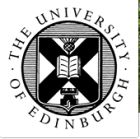These copies of the Holy Scriptures ... it is quite erroneous to suppose that the Christian is bound to offer any further proof of their genuineness or authenticity. It is for the objector to show them spurious; for on him, by the plainest rules of law, lies the burden of proof.
Simon Greenleaf, An Examination of the Testimony of the Four Evangelists, by the Rules of Evidence administered in Courts of Justice (1847), Section 10, p. 9

